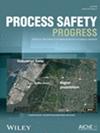Structural response for vented hydrogen-air deflagrations: Effects of volumetric blockage ratio
IF 1
4区 工程技术
Q4 ENGINEERING, CHEMICAL
引用次数: 0
Abstract
The explosion venting experiments of hydrogen-air premixed gas were carried out in a 1-m3 cuboid container. The effects of the obstacles parallel to the vent on the structural response of the container during the explosion venting were investigated. The internal overpressure and acceleration of the vessel wall were captured by acceleration and pressure sensors, respectively. The time–frequency distributions of pressure and acceleration were obtained by a Short-Time Fast Fourier Transform. The effects of obstacles on the dynamic structure response were studied by analyzing the internal overpressure, vibration acceleration, and high-speed videos. With the increase of obstacles, the maximum overpressure and vessel vibration increased, and the maximum overpressure and maximum vibration acceleration appeared earlier. The vibration signals had two dominant frequencies, 300-600 Hz and 900-1200 Hz. The low-frequency vibration (300–600 Hz) was induced by acoustic oscillation of the internal pressure. The high-frequency vibration (900–1200 Hz) was a container resonance triggered by the coupling of the flame and the acoustic wave. As VBR increased, the duration of high-frequency oscillations decreased gradually; the increase of obstacles would weaken the high-frequency structural response of the container. The results can guide the design of hydrogen explosion protection and mitigation measures.通风式氢气-空气爆燃的结构响应:体积堵塞比的影响
在1-m3的长方体容器中进行了氢气-空气预混气体的爆炸排气实验。研究了爆炸放空过程中平行于放空口的障碍物对容器结构响应的影响。通过加速度传感器和压力传感器分别捕获血管壁的内部超压和加速度。利用短时快速傅里叶变换得到了压力和加速度的时频分布。通过分析内部超压、振动加速度和高速视频,研究了障碍物对结构动力响应的影响。随着障碍物的增加,最大超压和容器振动增大,最大超压和最大振动加速度出现的时间提前。振动信号有两个主导频率,300- 600hz和900- 1200hz。低频振动(300 ~ 600 Hz)是由内压的声振荡引起的。高频振动(900 - 1200hz)是由火焰与声波耦合引发的容器共振。随着VBR的增大,高频振荡持续时间逐渐减小;障碍物的增加会减弱容器的高频结构响应。研究结果可以指导氢气防爆和减灾措施的设计。
本文章由计算机程序翻译,如有差异,请以英文原文为准。
求助全文
约1分钟内获得全文
求助全文
来源期刊

Process Safety Progress
工程技术-工程:化工
CiteScore
2.20
自引率
10.00%
发文量
99
审稿时长
6-12 weeks
期刊介绍:
Process Safety Progress covers process safety for engineering professionals. It addresses such topics as incident investigations/case histories, hazardous chemicals management, hazardous leaks prevention, risk assessment, process hazards evaluation, industrial hygiene, fire and explosion analysis, preventive maintenance, vapor cloud dispersion, and regulatory compliance, training, education, and other areas in process safety and loss prevention, including emerging concerns like plant and/or process security. Papers from the annual Loss Prevention Symposium and other AIChE safety conferences are automatically considered for publication, but unsolicited papers, particularly those addressing process safety issues in emerging technologies and industries are encouraged and evaluated equally.
 求助内容:
求助内容: 应助结果提醒方式:
应助结果提醒方式:


